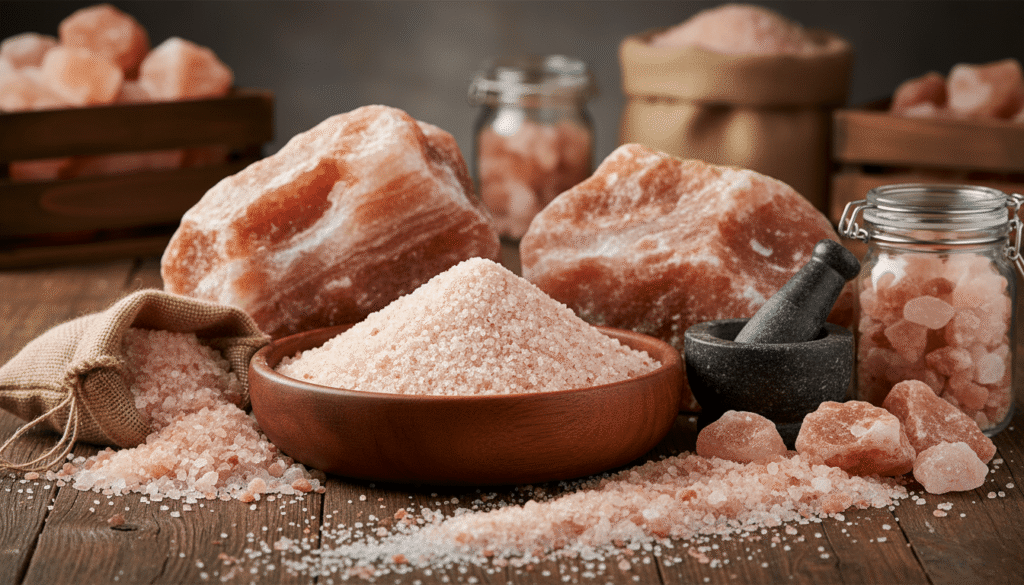
Introduction
Himalayan salt has become one of the most trusted natural salts in the world not just for kitchens but also for large-scale food industries. Whether it’s used in cooking, food preservation, or seasoning blends, food-grade Himalayan salt stands out for its purity and mineral content.
But when it comes to bulk supply, choosing the right salt isn’t as simple as picking any pink crystal. To ensure safety, quality, and long-term reliability, you must know what defines food-grade and how to identify a dependable bulk supplier.
Let’s explore how to choose food-grade Himalayan salt for bulk supply that meets both quality and compliance standards.
1. Understanding What “Food-Grade” Means
Before selecting a supplier, it’s important to understand what food-grade actually means.
Food-grade Himalayan salt refers to salt that:
- Is safe for human consumption
- Meets international purity and hygiene standards
- Contains no harmful chemicals or contaminants
- Is properly washed, crushed, and refined under hygienic conditions
Authentic food-grade salt comes from certified Himalayan salt manufacturers who follow quality control processes under ISO, HACCP, or FDA guidelines.
When buying in bulk, always request a certificate of analysis (COA) and quality certification from the supplier.
2. Source Matters: Go Back to the Mines
The best Himalayan salt in the world comes from the Khewra Salt Mine in Pakistan, located at the foothills of the Himalayas. This mine is over 250 million years old and produces naturally pink, mineral-rich salt crystals.
When choosing bulk suppliers, always check if they source directly from Khewra or nearby mines. Many companies repackage imported or lower-grade salt and market it as Himalayan, so verifying the origin protects your brand and your customers.
For verified, authentic salt directly from Pakistan’s Khewra mines, explore Sobaan Salt Pakistan, a trusted name in natural Himalayan salt exports.
✅ Pro Tip:
Work with Pakistani Himalayan salt exporters who can provide traceability details from mine to shipment.
3. Check Purity and Mineral Composition
Pure Himalayan salt contains around 84 trace minerals, including calcium, magnesium, and potassium. These minerals give the salt its pink hue and mild flavor.
A genuine supplier will share a lab test report showing the mineral composition and sodium chloride percentage (typically 97%–99% NaCl for food-grade).
Avoid salt that:
- Appears gray or too white (over-processed or mixed)
- Has moisture clumps (poor storage)
- Feels sticky or impure to touch
The purer the salt, the longer it will last which is crucial for bulk food processing and packaging.
4. Choose the Right Grain Size for Your Application
Food-grade Himalayan salt comes in multiple grain sizes, and choosing the correct one depends on how you’ll use it:
| Grain Size | Common Use |
| Fine Salt | Cooking, seasoning, bakery mixes |
| Medium Salt | Pickling, meat curing, table salt |
| Coarse Salt | Grinders, spice blends, salt crusts |
| Powdered Salt | Food manufacturing, snacks, flavoring |
A reliable bulk supplier will offer custom grinding and sieving options ensuring the salt matches your exact industrial or culinary needs.
5. Evaluate Packaging and Hygiene Standards
When buying in large quantities, packaging plays a big role in maintaining quality. Look for suppliers who provide:
- Food-safe, moisture-resistant bags (usually HDPE or PP woven)
- Proper labeling with batch numbers and production dates
- Tamper-proof seals to prevent contamination
Always ensure that your supplier follows GMP (Good Manufacturing Practices) and ISO food safety systems.
6. Compare Pricing, But Don’t Compromise on Quality
While cost is a major factor in bulk purchasing, going for the lowest price can backfire. Extremely cheap Himalayan salt often indicates poor filtration, manual sorting, or mixed impurities.
Instead, compare suppliers based on:
- Per-ton pricing with transparent shipping costs
- Quality certifications and packaging type
- Customization (logo printing, branding, etc.)
- After-sales service and shipment tracking
High-quality salt ensures fewer customer complaints and better shelf life which saves money in the long run.
7. Work with Experienced Bulk Suppliers
Experience matters. Reliable suppliers understand export documentation, food-safety regulations, and international shipping standards.
When choosing your bulk Himalayan salt supplier, consider:
- How long they’ve been in the salt industry
- Whether they export globally
- Their client base (food brands, wholesalers, manufacturers)
- Customer testimonials and online reputation
Tip: Look for companies that handle both mining and processing; it ensures consistency and traceability from the mine to your facility.
8. Sustainability and Ethical Sourcing
Modern buyers care deeply about sustainability. Working with eco-friendly Himalayan salt suppliers adds value to your brand and shows responsibility.
Ask your supplier about:
- Eco-friendly mining methods
- Fair-trade labor practices
- Recyclable packaging options
Suppliers that respect both the environment and community welfare are viewed more favorably by international partners and consumers alike.
9. Final Checklist Before Bulk Purchase
Before placing your first bulk order, make sure you:
✅ Verify mine origin and purity test reports
✅ Check certifications (ISO, HACCP, FDA, or Halal)
✅ Confirm grain size and packaging details
✅ Review pricing transparency and shipping policy
✅ Choose suppliers who prioritize ethical mining and hygiene
Once these points are checked, you’re ready to build a long-term partnership with a dependable salt provider.
Conclusion
Choosing the right food-grade Himalayan salt for bulk supply is about more than just finding a product; it’s about trusting the source, ensuring purity, and upholding quality standards that protect your customers.
By selecting certified, experienced suppliers who mine and process salt responsibly, you guarantee consistency, safety, and authenticity in every grain.
Whether you’re a food brand, distributor, or manufacturer, taking the time to vet your Himalayan salt supplier pays off with better product quality, stronger brand credibility, and loyal customers who taste the difference.
